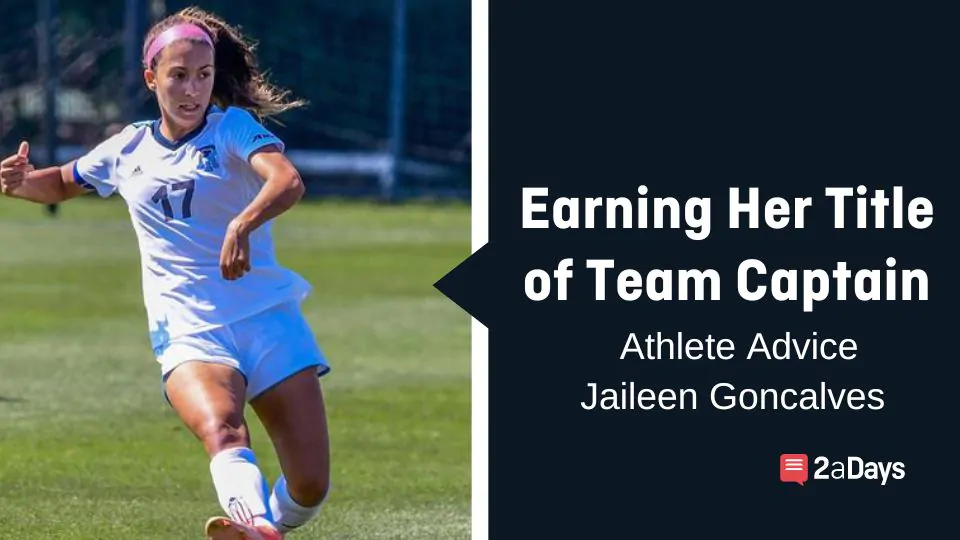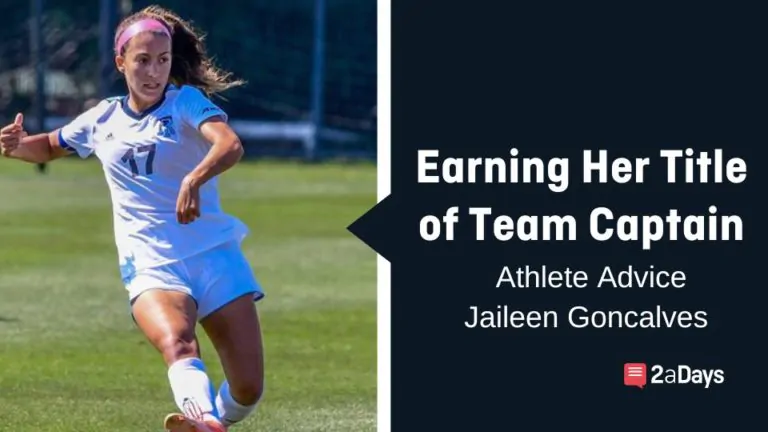I have always aspired to be a leader. I was the captain of my club team for three years and the day I committed to play Division 1 soccer I envisioned what it would be like to be the captain of my college team. My freshman year I passed all of our fitness tests, worked very hard to earn a starting spot, and gave 110% every game–but I was too scared to overstep so I was fairly quiet. Eventually I became team captain but I made some mistakes along the way. Here's my story.
In spite of being timid initially, at the end of my first season my coach told me he could see me leading this team, but I had to work on being more vocal on the field. The following year we got three new coaches and I knew I was going to have to prove myself all over again.
Growth and Challenges
My sophomore year was much different than my freshman year. We did not do as well and we had many injuries on the team. My coach relied on me to play whatever position was needed that game. That year on the field was when I started to develop as a leader. As the new coach put trust in me, I put more trust in myself, which also allowed the team to put their trust in me as well. I was consistent and always did what my coach asked of me. Whatever she needed from me that day, I gave it to her and she could always count on me to give 110% no matter what the circumstances were.
After my second season, I felt I grew a lot as a player and started to take on a bigger role on the team. Before we went home for Christmas break I had a meeting with my coach and she told me I was going to play a big role on the team these next few years. We lost a lot of seniors that year so I knew I had to step up. That spring I made it a goal to lead the team, be more vocal, and take charge. Before the spring season ended my sophomore year I was named captain. It takes perseverance and a great amount of effort to be named captain at the collegiate level, but there are also characteristics an individual must have within them. The most important traits one must have in order to get there are decision making capabilities, hard work, influence, positivity, commitment, confidence, communicability, passion, and empowerment. There are a long list of qualities I think a leader needs to have, but those are the most important to me.
As a two year captain there were many responsibilities I had to uphold. Being a captain was a full time job both on and off the field. I was responsible for holding the team together. When we were having a bad game, my teammates would look up to me on the field to find a solution. Your coach is not on the field playing the game with you, so as captain it's up to you to problem-solve on the fly. When a player was feeling down because they made a bad play, I made sure I went up to that player, patted them on the back, and said “it's ok, keep your head up, we need you.” When someone scored on us, I gathered my teammates before the next kickoff to remind them “we are fine, we have plenty of time left.” Like I mentioned before, it was my job to hold us together and I did the best I could every game. I played defensive center mid so I was able to see most of the field and my main job was to organize. I had to ensure we were playing as a unit, we were all connected, and everyone was where they needed to be positionally.
Besides the responsibilities on the field, there were also many off the field. Being a captain is much more than leading your team to success on the field. Playing a Division 1 sport is a huge commitment and it is mentally and physically taxing. My teammates who were struggling with mental health, academics, or something in their personal life would come to me for advice. I was there for them no matter what the circumstances were. I put the team before myself and learned how to stay positive and strong for my teammates. As a captain there are so many responsibilities you have to take on. It starts with holding the team together on and off the field, being the communicator between the coaches and players and vice versa, and always staying positive no matter how tough it gets because everyone is looking at you. If you don't have it together how is the team supposed to? Being a captain also consists of the little things no one thinks of: I had to make sure everyone had the equipment they needed when we traveled, I was the last one to leave practice to make sure everything was picked up, I was always worried whether the last person dropped the laundry, I was accountable for making sure everyone was getting in for treatment/recovery, and the list continues. It was a full time job, but I would not change a thing.
Not All Fun and Games
My assistant coach always told me,”not everyone on the team is going to like you, but they will respect you.” Unfortunately, as a captain you have to make some tough choices and you are going to have conflicts with the other players. When I was a captain my junior year there was a freshman on the team that I never saw eye to eye with. She was very good, but only when she wanted to be. She relied on her talent and because of that she did not feel the need to work hard. My coach loved her because she was good, but I had a tough time dealing with her attitude and lack of effort. I handled it the best way I could on the field, but other girls on my team were starting to have a problem with her attitude as well.
That spring season things started to escalate with this player and as the only captain I did not know what to do. She was skipping reps in the weight room and everyone on the team knew. My teammates were coming to me everyday telling me she was not putting in the work and was completely skipping circuits. I tried to have private conversations with her telling her we need more from her, I was very calm and level headed. Then one day things took a turn. At the end of the lift we were doing a “finisher.” We all hated them and they were HARD.
Related: Q&A: Scholarship Offers and Getting on a Coach's Radar from URI Women's Soccer Captain
Her group was going to be the last to finish and instead of completing the last set she encouraged her teammates to do less with her. If she wanted to do less and hurt herself that is one thing, but do not bring the team down with you. That day I knew something needed to change. I confronted her in the weight room more sternly and seriously, she laughed, took it as a joke, and walked out of the weight room. Later that day I got a text from my coach asking if me, my other teammate, and the player I was having a problem with could meet. I thought my coach had heard about the issue we were having and wanted to talk about it…but that was not the case.
Instead, my coach named this girl captain. A freshman captain. I had never heard of that ever happening. I tried to tell my coach about the prior issue, but she did not do anything about it. The following year, my senior year now, the freshman captain, now sophomore captain, came into preseason and did not pass our fitness test. This was just the start of it. As a captain, you need to pass the fitness tests, you are setting the example for the rest of the team. Besides not passing, she had a terrible attitude on and off the field. About a month went by and no one on the team respected her as a leader, it created a very negative environment and was affecting our performance. My coach took it upon herself to revoke her captainship. That was one, very big challenge I had with a player, but other challenges consisted of players not being happy with playing time and players not doing their job and not being happy about getting held accountable.
A Happy Ending
The best experience as a captain that I will remember for the rest of my life was senior day. Throughout the two years there were many ups and downs, many hardships, lots of emotions, and some days I questioned why I was doing this. Being a captain is a lot of work and many people do not realize how hard it can be. My last game as a collegiate athlete, senior day, made this whole experience as a captain worth it. The underclassmen put together a jar for each senior, and in this jar every player on the team wrote on a piece of paper a note to the senior. After reading the notes in my jar I realized the impact I made on each player. I am going to keep these notes for the rest of my life as a reminder of the lives I changed and helped throughout my collegiate career. Every hardship I faced as a captain was worth it because of the impact I made. There were many other great experiences throughout my two year captainship, but that was definitely the most memorable.
Related: Rate your Coaches, Facilities, and Campus Visits
As I mentioned earlier there were many ups and downs. When I was named captain our program was trying to rebuild. We had coaches coming in and out every couple of months. It was very tough on the team chemistry with not only the coaches, but players as well. I was one of the only stable leaders we had so many girls looked up to me, but it caused me to put a lot of pressure on myself. I struggled with finding a balance of being “too nice” as my coach would say and knowing when I had to be a little more tough on the team. My senior year we had 14 new freshmen..and that was extremely hard to deal with. I wanted to ensure all of them felt welcomed, a part of our family, and I wanted to make their transition as smooth as possible. Usually we have about 5-7 new freshmen and I did not know how to handle 14 new girls, it was like an entire new team. The coaches would laugh and call me the “team mom.” I definitely have motherly characteristics, but sometimes I just wanted to be the captain of my team. I was constantly stressed trying to make sure the freshmen were getting their study hall hours done, making sure they packed all their stuff for our trip, going in for treatment, and lots of other things. It was exhausting, but I wouldn't take any of it back.
Yes, those years were an emotional roller coaster, full of happiness, stress, tears, anxiety, laughs, and smiles, but I would do it all over again. Being a team captain taught me to put others before myself. I learned I have a passion for leading others and I have the ability to empower individuals. My life is not the same without my team and I hope one day I get the chance to lead others again.
Have an idea for a story or a question you need answered? Want to set up an interview with us? Email us at [email protected]
Image Credit: URI Athletics
* Originally published on January 12, 2023, by Jaileen Goncalves







